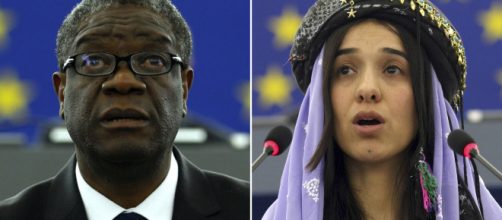Accompanied by British politicians and activist group justice for Lai Dai Han (JLDH), 2018 Nobel Peace Prize Laureate Nadia Murad will unveil a statue next week in London commemorating victims of sexual violence the world over.
“For too long these victims of sexual violence have been forgotten and cast aside by society," commented Jack Straw, former UK foreign secretary and international ambassador for JLDH. Increasingly, thanks to the ongoing work of activists like Murad and JLDH, survivors seem to be finally getting the recognition they have long fought to receive.
This is not the first time Murad, a survivor of sexual violence herself, has partnered with JLDH to raise awareness of the plight of Vietnamese rape victims. Speaking at a London event in January, Murad called on the international community to bring perpetrators to justice, declaring “these criminals enjoy more rights, freedom and life than the victims themselves.”
The Lai Dai Han's struggle for recognition
“Lai Dai Han” is a pejorative term for children born to Vietnamese women raped by South Korean troops during the Vietnam War. Between 1964 and 1973, some 320,000 South Korean soldiers were deployed to Vietnam to fight alongside US troops, leading to the rapes of thousands of Vietnamese girls and women.
Survivors were often imprisoned, cast out from their families, and charged with “sleeping with the enemy.” Meanwhile, their abusers returned to their homes, never to be brought to account.
Indeed, the generation of mixed-lineage Lai Dai Han has never been acknowledged by the South Korean government or military authorities, while in Vietnam they have been ostracised and banished to the margins of society, struggling their entire lives to access basic public services such as healthcare and education. Their elderly mothers appear to have lost hope for a formal apology within their lifetimes.
Murad's campaign for justice
It’s not surprising that Murad has thrown herself behind the Lai Dai Han’s call for recognition given her own harrowing past as an ISIS captive forced into sexual slavery.
In 2014, ISIS fighters descended on Yazidi territory in Iraq’s Sinjar region, capturing thousands of women to be sold and exploited throughout the militant group’s caliphate network. While Murad managed to escape and receive asylum in Germany, an estimated 3,000 Yazidi women are still missing.
Using her freedom to campaign for her sisters’ release from ISIS captivity, Murad’s vocal support has rapidly expanded to include groups of survivors around the world who, like her, have been the victims of conflict-related sexual violence. In 2016, she was named the United Nations’ goodwill ambassador for survivors of human trafficking, becoming the first survivor of atrocities to ever have been awarded the distinction.
No longer silent
With survivors often forced to hide in shame, Murad is spearheading a new discourse that would see sexual violence in conflict take front and centre in international discussions. As such, she has helped draw attention to a crime which remains all too common around the world, and one that is rarely brought to justice. As Murad’s fellow Nobel Peace laureate, Congolese doctor Denis Mukwege, put it: “Sexual violence in DRC is blind. It affects each and every generation...This must stop”.
The ramifications for communities who fail to deal with their own burdens of conflict-related sexual violence are very real indeed. A decade after the Sri Lankan civil war, Tamils are still speaking out about the sexual assaults they suffered during the bloody conflict, with scores of men and women describing their experiences of sexual abuse or rape at the hands of government forces.
Aside from weak resolutions at the United Nations Human Rights Council urging Sri Lankan authorities to pursue reconciliation, Tamil survivors have been left in the dark as their country rebuilds.
Worse still, worrying reports have begun to surface that these aggressions, targeting the same groups, may still be occurring. The stories carry the same threads: women and men abducted at home or off the streets by men in vans, before being tortured and assaulted for days, weeks, or months before their release is secured by a bribe. Amid calls by civic groups for official investigations, the Sri Lankan High Commission in London has described the allegations as a “travesty of the truth”.
For too long, the voices of the survivors of these atrocities have been silenced by perpetrating authorities and sidelined in restoration efforts.
The issue remains woefully underfunded - less than 1% of aid money is allocated to tackling gender-based violence during conflict, as was emphasized at a recent conference in Oslo. Amid a rising tide of survivors’ stories and demands to be heard, however, Murad’s activism may, hopefully, finally spark a sea change.


